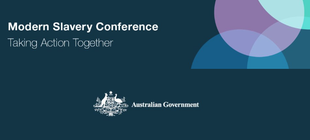Taking action together at the Modern Slavery Conference in Australia
An impressive community of practice gathered for the Australian Government's Modern Slavery Conference, June 27-29 in Melbourne. According to the latest estimates, nearly 50 million people live in conditions of modern slavery, with half of them facing daily realities of forced labour.
More than 450 practitioners from government, civil society, academia, and industry explored ways of strengthening collaboration to address modern slavery, both domestically and in global supply chains. Electronics Watch participated in two sessions, presenting our model of impact through collaboration, and discussing our work on forced labour and remedy in supply chains.
The premise of the conference was two-fold. First, that "taking action together," across sectors and with a broad range of stakeholders, is necessary to generate the combined leverage to drive progress. Second, that "people-centered approaches" are fundamental to meaningful change. Within those themes, the three content-packed days included sessions on modern slavery trends, survivor advocacy, migrant worker recruitment, grievance mechanisms, remedy, the role of technology to gather data on modern slavery risks, and much more. Björn Claeson, Executive Director of Electronics Watch, presented Electronic Watch's impact model in a session on The Power of Partnerships—working with public buyers, civil society monitors, and industry, in our case. In another session he also discussed cases of forced labour and remediation, and presented our new Principles of Worker-Driven Remedy.
Australia's Modern Slavery Act itself was a central topic of conversation, focusing on a set of 30 reform recommendations included in the recent review led by Professor John McMillan. This authoritative review notes that the premise of the Modern Slavery Act is that it can generate counter-pressure to the commercial incentive to seek out underpaid and exploited labour, by requiring governments and businesses to examine their supply chains and account for the ways they mitigate risk of modern slavery. In order to do so more effectively, the review recommends amending the Act to require a mandatory due diligence system beyond the reporting obligation. It also recommends imposing penalties for failure to report, false reporting, or lack of a due diligence system; and establishing an office of a national Anti-Slavery Commissioner.


